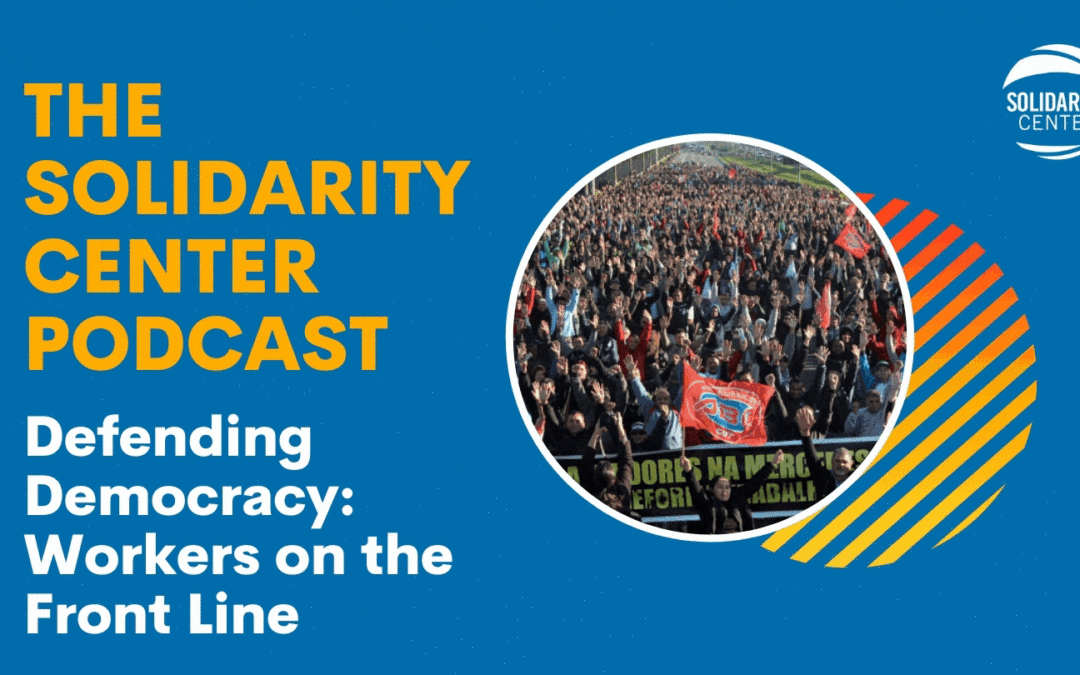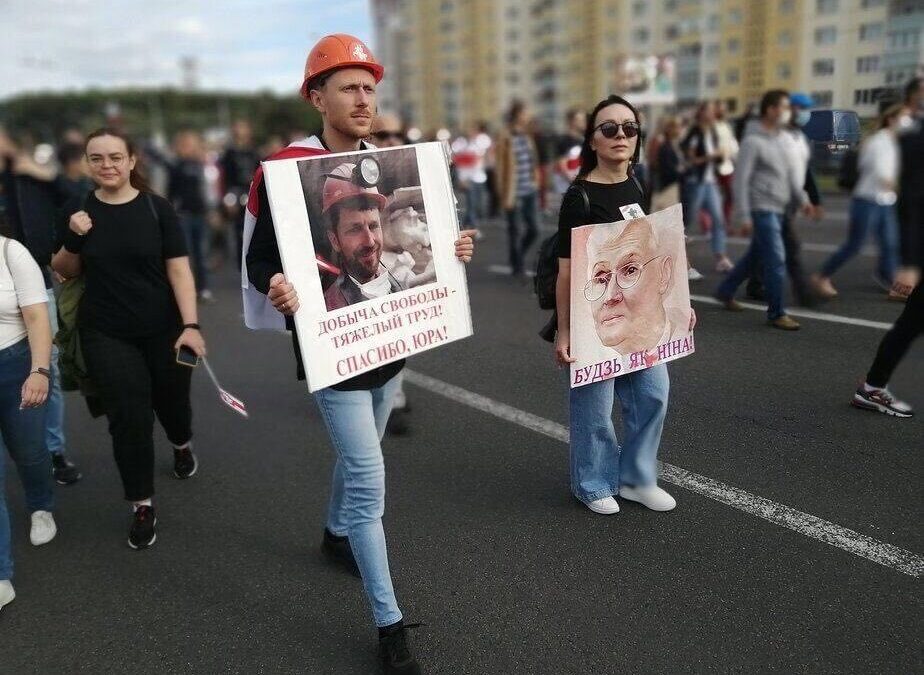
Mar 19, 2021
Democracy is under siege around the world with the subversion of democratic processes and outright coups—and attacks worker rights are a big part of authoritarian efforts to cut off civil liberties.
On this week’s Solidarity Center Podcast, two worker advocates from countries where democracy is under threat—Belarus and Brazil—discuss how workers are pushing back against repression and are building a better future for their countries, one that recognizes worker rights are a foundation of true democracy.
Maximilano Garcez, president of the Brazilian Association of Union Lawyers, represented families of the 272 people who died in a preventable mining disaster in 2019. The Brumadinho mining waste dam, held by walls of sand, collapsed during rainy season cutting a path of destruction from the mine and for miles into the surrounding community. It is among nearly 100 mining dams in the country built the same way.
The mining disaster was “industrial homicide”—the result of corporations “incentivized to greed” in a system where “killing people has been worthwhile,” says Garcez.
Workers Rise Up in Belarus Against Repressive Regime
Also on the show, Sergey Antusevich, vice president of the Belarusian Congress of Democratic Trade Unions, describes the recent uprising against the country’s repressive regime in which workers, led in many cases by women, have taken a key role.
“Many factories began to express a position actively, protest against violence and fraud, and started for the first time in Belarus history to set up strike committees” despite a strike ban, he says.
“At the same time, the protesters made demands: resignation of Lukashenko and his clique and an end to violence and repression and holding fair elections. At the same time, workers and employers began to quit the state trade unions and tried to create independent trade unions.”
The Solidarity Center Podcast, “Billions of Us, One Just Future,” highlights conversations with workers (and other smart people) worldwide shaping the workplace for the better.
Join us for a new episode each Wednesday at iTunes, Spotify, Amazon, Stitcher or wherever you listen to your podcasts.
Solidarity Center Podcast Schedule
- March 24: Preeda, a migrant worker rights activist in Thailand working with unions to help migrant workers meet the challenges of COVID-19.
- April 7: Francia Blanco, a domestic worker and trans rights activist reaching marginalized workers through her all-trans domestic workers union.
- April 14: Adriana Paz, an advocate with the International Domestic Workers Federation who understands firsthand the power of unions in ensuring domestic workers have safe, decent jobs.
- April 21: International Trade Union Confederation President Ayuba Wabba, who explores the Nigerian labor movement’s response to the COVID crisis on workers and discusses the global labor movement’s plans to build back better for workers around the world.
This podcast was made possible by the generous support of the American people through the U.S. Agency for International Development (USAID) under Cooperative Agreement No.AID-OAA-L-16-00001 and the opinions expressed herein are those of the participant(s) and do not necessarily reflect the views of USAID/USG.

Oct 30, 2020
A vicious crackdown in Belarus on striking workers peacefully protesting President Lukashenko’s refusal to leave power despite months-long popular protests is drawing the attention and condemnation of worker and human rights experts, including Amnesty International, the AFL-CIO, the Solidarity Center and the International Trade Union Confederation (ITUC).
“The right to strike is guaranteed under international law, and the government is obliged to respect this right, all the more because Belarus has ratified ILO Conventions 87 and 98,” says ITUC General Secretary Sharan Burrow, who also denounced Belarus’s violation of workers’ fundamental right to freedom of assembly and of association rights through police violence and threats targeting the general public.
Lukashenko, in power since 1994, claims to have won the August 9 presidential election by a landslide, even though his political opponents and citizens charge poll-rigging. The country’s almost daily protests since then have incurred an authoritarian response that, so far, has led to several deaths, hundreds of injuries and more than 10,000 arrests.
In Minsk, where 100,000 people marched to deliver a “People’s Ultimatum,” authorities cut off mobile internet access, closed down public transportation, turned out balaclava-clad riot police and military and riot control vehicles at strategic sites, and attacked protesters in the evening.
Participants in Monday’s general strike, including ITUC affiliate the Belarusian Congress of Democratic Trade Unions (BKDP), demanded Lukashenko’s resignation, a halt to the crackdown and the release of political prisoners. Thousands stayed home or took to the streets—including workers at state-owned factories and private enterprises, including restaurants and cafes—as well as university students and their teachers. At least 155 people were arrested for supporting the strike in Minsk, Borisov, Brest, Grodno, Mogilev and Novopolotsk, human rights group Vesna reported.
Intimidation may have had a chilling factor on the strike, says the BKDP, who also reported that peacefully protesting workers at Minsk’s Hi-Technology Park were being intimidated and dispersed. Other intimidation tactics included visits by security officers to the homes of workers who failed to start their shift at Grodno Azot, a major nitrogen fertilizer producer in Grodno, as reported by the Associated Press.
“A frank disregard is being shown for the most basic of human rights, and the right to strike is now one more that is being mercilessly crushed,” says Amnesty International Acting Director for Eastern Europe and Central Asia Denis Krivosheev.
The AFL-CIO, in a letter to the BKDP president, praised the BKDP, its affiliates and members for their support for worker rights and democracy despite government repression and harassment.
“Intimidation must end. We support the right of workers to participate in collective actions specifically to demand fair and democratic elections,” says Solidarity Center Europe and Central Asia Director Rudy Porter.
The ITUC Global Rights Index, has ranked Belarus “no guarantee of rights” for many years under Lukashenko’s government, including in 2020, in part because legal strikes are effectively impossible while illegal strikes fall afoul of severely punitive legislation.
Update: Read the BKDP’s November 2 statement regarding the punishment of striking workers and their leaders, in Russian.


